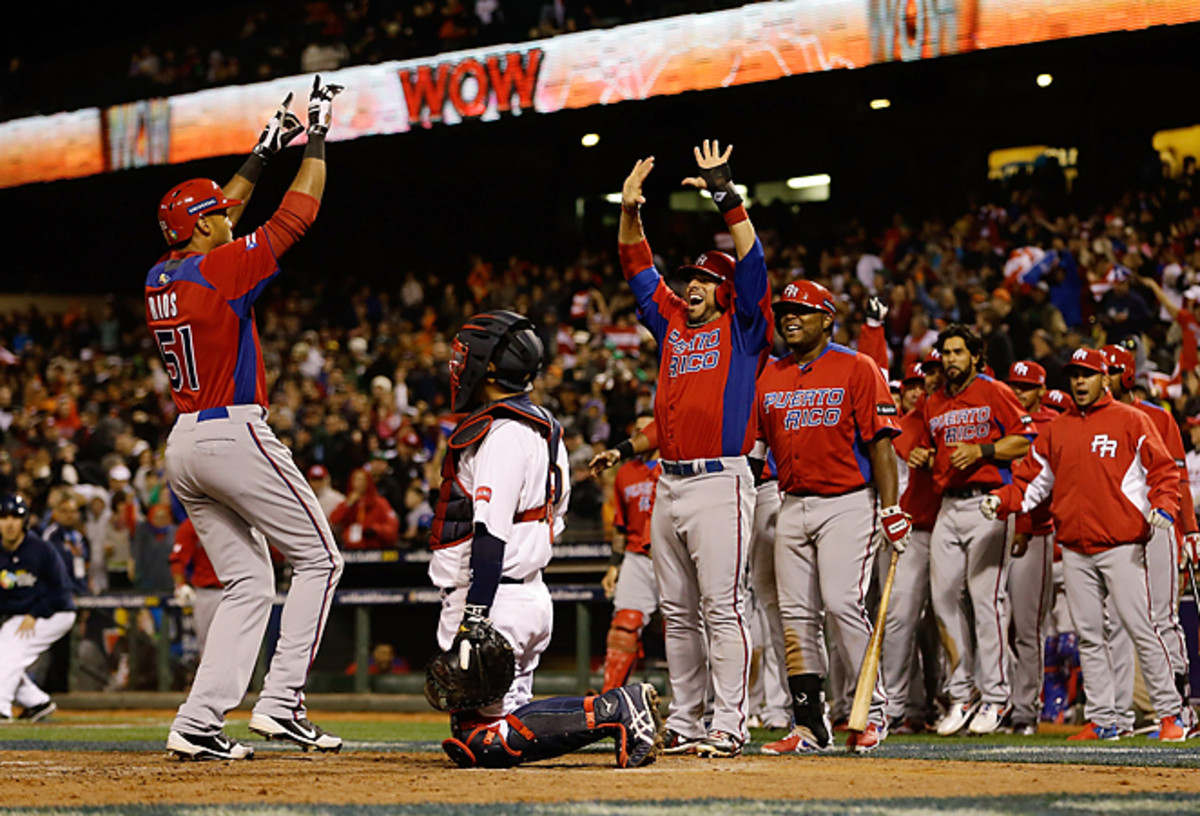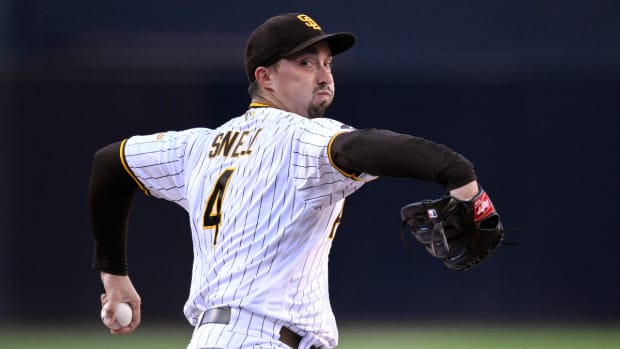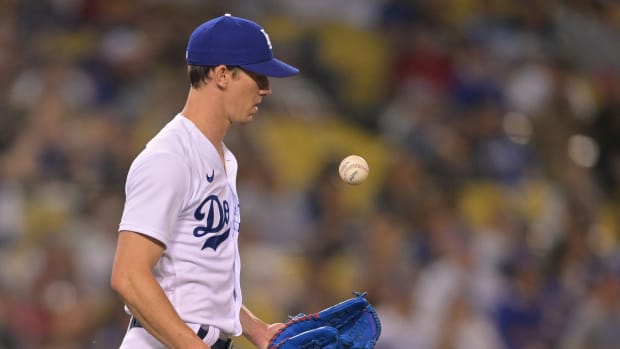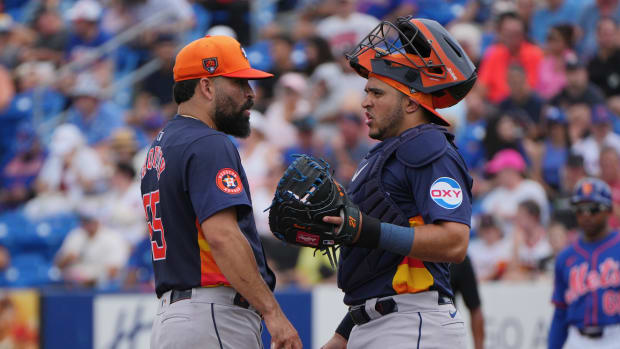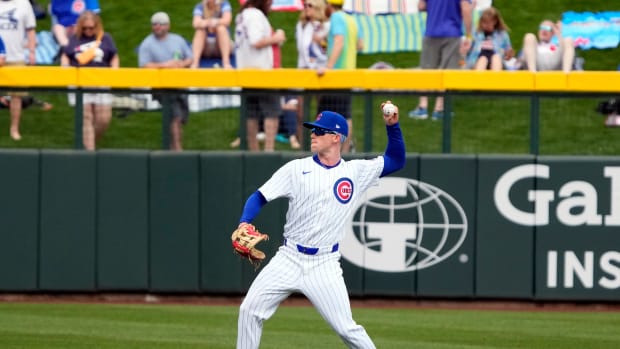Puerto Rico plays for game's legacy in World Baseball Classic

Puerto Rico has approached the WBC as a chance to revive the sport's declining popularity at home.
Ezra Shaw/Getty Images
SAN FRANCISCO -- They held a retirement party for Pedro Valdes in Puerto Rico in January, after one last winter ball season. They told jokes and laughed at all the good times of a professional baseball career that began when the Cubs selected him in the 12th round of the 1990 draft, a draft in which the Cubs took 46 players and none of them won a game in the big leagues or topped Valdes' meager 21 hits and one home run.
Not that Valdes didn't go to the ends of the earth to try to get more than his cup of coffee out of the big leagues. He turns 40 this June. There is gray in his beard. It was finally time to give up a baseball journey in which he played 10 years in the minors in the Chicago and Texas organizations, followed by another 11 years in which he bounced from Japan to Mexico to Korea and back to Mexico.
Edwin Rodriguez was there at the party. The manager of the Puerto Rico team in the World Baseball Classic brought a Puerto Rico ballcap with him. He put it on Valdes' head and said, "You're not done yet. You'll have to wait a couple more months."
Puerto Rico needed him, even as a bench player. Perhaps no team in the World Baseball Classic needed to search farther below the baseball radar to find players than Puerto Rico. Filled with Mexican Leaguers, Far East job seekers, the unemployed, the late-rounders and the baseball lifers, the Puerto Rico roster has 12 players born in the 1970s. What's missing are many major league players in their prime. Only eight players were born after 1984.
There is a reason for that gap. Baseball has dropped in popularity and participation on the island, a decline blamed on everything from volleyball to basketball to entertainment options for kids such as video games to the crumbling infrastructure of the once-proud winter league teams there.
If the purpose of the World Baseball Classic is to grow the game internationally, then few wins in these three WBC tournaments held more meaning than the one Sunday night: Puerto Rico beat two-time defending champion Japan, 3-1, to advance to the final Tuesday against the winner of the semifinal tonight between the Dominican Republic and the Kingdom of the Netherlands, two countries with a strong baseball foundation in place.
So often the words associated with the WBC are about the pride of playing for country. The Puerto Rican players do so -- and more. They also play to revive a fading legacy.
"We have a big responsibility," centerfielder Angel Pagan said. "That's the kind of legacy I need to leave in the sport -- to be the kind of player kids want to follow, the way it was for me and so many others watching the Robbie Alomars and Bernie Williams."
Pagan was sitting in the Puerto Rico dugout -- the visiting side at AT&T Park, where he otherwise occupies the other side as a member of the world champion Giants -- and over his Puerto Rico jersey he was wrapped in a Puerto Rico flag. The U.S. team had far more talent then Puerto Rico, but nobody on team USA talked about leaving a legacy. Nobody gathered the team in the dugout before games like a Little League team, as Pagan did, to make sure everybody stayed positive -- to make sure they knew that a dream remains a dream as long as you believe in it. Nobody on the U.S. squad cared the way Puerto Rico cared.
Team USA went home. Puerto Rico is on to the finals.
"Words aren't enough to explain what this feels like," outfielder Alex Rios said.
Puerto Rico is one of the smallest entrants in the tournament based on population. It has 3.6 million residents, about the same population as Yokohama, which is not even the largest city in Japan.
Nonetheless, Puerto Rico took down mighty Japan, which had been 17-6 in WBC competition and gave off a sense of entitlement, like they owned the joint, not just the first two championship trophies. Japan's players threatened last year not to play in the WBC -- "a painful decision for further generations," their union chairman called it -- unless they gained a bigger chunk of the WBC's takes from sponsorships and merchandising.
Sandwiched around a seeding game loss to the Dominicans, Puerto Rico played two elimination games against the powerhouses from America and Japan and knocked out both. They sent Japan home with the following dance line of unheralded pitchers:
- Mario Santiago, 28, a guy with a 36-51 minor league record who pitched in Korea last year, losing two starts in the Korea Series.
- Jose de la Torre, 27, an undrafted, career minor leaguer out of Texarkana College who has pitched for three organizations, most recently for Boston at Triple-A Pawtucket.
- Xavier Cedeno, 26, a former 31st-round draft pick who threw 31 innings for the Astros last year.
- Kevin Fontanez, 23, a former 27th-round pick of the Mets yet to pitch above Class A ball.
- J.C. Romero, 34, a former major leaguer who is unsigned.
- Fernando Cabrera, 31, who has a 5.24 ERA over 175 1/3 major league innings and who has pitched in 396 minor league games, most recently for Buffalo, the Mets' Triple-A affiliate.
USA mop-up reliever Heath Bell will make more in five days this year than those six pitchers will make in a year, but the Puerto Ricans still are playing and they still are believing. Rodriguez, unlike USA manager Joe Torre, is not shackled by 30 MLB general managers carping about their fragile pitchers' throw schedules. In fact, Puerto Rico is completely without shackles. It plays the game with a camaraderie and purpose that is fierce. The land of Clemente wants its baseball pride back.
"I never saw him play," Pagan said about the island's patron baseball saint, "but he was my father-in-law's neighbor. He talked to me all the time about the passion he played the game with. It's the legacy I want to leave behind."
Puerto Rico does have Yadier Molina, "the best catcher in the world," as Santiago called him. And who could argue after Molina has steered a pitching staff without much of a big league portfolio, one that almost never gets the baseball above 90 mph, right through USA and Japan. The two teams scored only four runs combined against Puerto Rico, and Molina, whom no pitcher dares shake when it comes to his game-calling, is a major reason.
The club also has Pagan, Carlos Beltran -- one of the last of the last wave of great Puerto Rican players -- Alex Rios, who has played nine big league seasons without ever seeing the playoffs and Mike Aviles, a scrappy utility player who plays with the heart of Valdes. Otherwise, Puerto Rico does not have star power.
What the team has is a big sense of purpose. It may not be quite a campaign to save baseball in Puerto Rico, but it's close. It's about getting a generation of kids back on the ballfields with all that history.
When Santiago was growing up in Salinas, he lived near the Alomar family. When Robbie and Sandy Jr. would take batting practice, little Mario would shag the baseballs they sent flying into the Caribbean sky. Mario's father worked hard at a jail, and Sandy Alomar Sr. became a baseball mentor to the boy, who soaked up the history and techniques of the sport. Santiago is 28 now, back from Korea, a veteran of 156 minor league games, and property of the Dodgers, still trying to get to the big leagues. After the final Tuesday night, he will return to Dodgers in Glendale, Az., to keep working on that dream.
But first, this dream still is alive. Puerto Rico still believes. It's not just about winning the World Baseball Classic championship, the best international tournament in the sport. It's about much more than that. It's about more than one night. It's about the generations who paved the way before them, and to awaken those who might follow.






























